
The last few years have brought an onslaught of entertainment taking the focus away from traditional heroes and putting the spotlight on villains. We might not be finished with the perfect superhero concept, but it appears we’re beginning a new age of imperfect anti-heroes who still want to do the right thing, but with a little flair of their own.
The new evil isn’t so evil
The anti-hero. The bad guy. The villain. Years of superhero movies have imposed a strict do-good/be selfless moral upon movie goers, but it appears our tastes are changing. Traditionally evil characters like Cruella, Maleficent, Loki, and Harley Quinn now have films and shows of their own. And they aren’t looking so evil anymore.
What is it about these characters that makes them likable? Why are we so in love with the “bad guys”?
With traditional antagonistic characters like Disney’s Maleficent, it’s easy to see why these new origin stories are so popular. They give Maleficent an added layer of depth she lacked in the 1959 version of Sleeping Beauty.
Audiences see Maleficent isn’t vindictive for no reason. Rather she’s suffering a great loss at the hands of King Phillip and wants him to feel her pain in return. Seems fair to me.
That’s not the only twist we get though! Audiences are then given a – dare I say – redemption arc for Maleficent as she ends up waking Aurora from her sleep, giving “true love’s kiss” a new meaning.
We see similarities with Disney’s Cruella Deville. The traditionally insane fashion designer with an obsession for fur also develops layers in the 2021 origin story.
Audiences can see the childhood trauma inspiring her vivacious fashions. Cruella is transformed from the crazy lady in the black and white fur to the slightly less crazy lady who (spoiler alert!) uses every means necessary to avenge her adoptive mother. A sentiment more easily empathized with than her wild obsession with killing puppies for the sake of fur coats (depicted in Disney’s 101 Dalmatians).
Is that all?
Was it simply that audiences have been yearning for more depth from traditional villains? A depth that makes them more real, understandable and three dimensional? I give you evidence lot number three. Let’s look at Marvel’s Loki, the adoptive brother of Thor.
Loki has captivated many with his devil-may-care attitude and consistent plot twists. It’s no surprise audiences find him really (really) attractive. But is it the devil-may-care attitude alone creating this attraction?
Maybe the rise in anti-hero fanaticism is just a nice change from the traditional interests of society. The do good and be selfless for the good of humanity concept pushed by typical hero stories.
Characters like Loki force a perspective change on audiences. We got very used to that typical hero saving the weak because they should. The hero that wins over evil because they’re strong.
We need a little rebellion in our heroes
This hero to anti-hero perspective change lets us relate to new characters who have an unconventional, interesting approach to situations. It gives audiences a chance to say “F You” to society as their preferred villain does (because at some point or another we’ve all wanted to).
It’s liberating to sit down and watch a character turn convention on its side. Instead of watching heroes grow more perfect and idealized, we see them become flawed and human. Audiences see a character on screen we actually relate to.
It doesn’t stop there. Our anti-heroes, bad guys and villains aren’t simply becoming more attractive to audiences because screenwriters give them relatable backstories and interesting character arcs. It’s that many are also morally grey. This is liberating.
In contrast, characters like Marvel’s Captain America, who while likable, is very black and white on the hero to villain scale. He has a great storyline but is honestly a little insufferable. He’s got seemingly perfect morals and acts on them to the point where it seems he’s literally unable to do anything else. This is emphasized by characters like DC’s Harley Quinn in the 2021 film Birds of Prey.
With Harley, audiences see morals jump all over the place. She’s often motivated by her own gains, yet beloved by many. Birds of Prey took an over-the-top, psychotic caricature and made her almost like a real person searching for themselves.
Society loves a good anti-hero or villain. Not because they’re bad. We love them because they give us the freedom to feel like we don’t always need to be the hero of our own lives.






